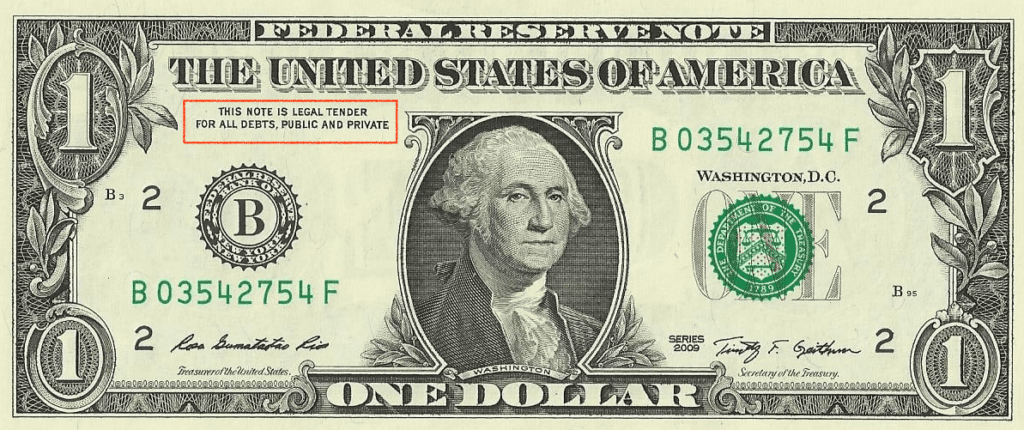These Related Stories
What You Need to Know About CBDC
Share this
There’s an initiative underway by global governments and central banks to introduce a new money system. Collectively called Central Bank Digital Currencies, or "CBDCs" for short, this new system is being introduced in response to the popularity of cryptocurrencies. The topic of CBDCs is controversial. Some view this as a natural evolution of money in a digital world. But others view CBDCs as being a Trojan Horse. They say it will increase government surveillance and control over the lives of private citizens. This article is what you need to know about CBDCs.
Frankly, this isn’t an easy topic to write about. Like so many issues in American society, one’s view of a topic like this can quickly devolve into a right versus left political issue. But it’s a significant issue that could affect ALL Americans. It could be a significant negative issue if you logically think through how governments might use something like CBDCs. Keep an open mind as you read about what you need to know about CBDCs.
What is Money?
Asking, "What is money?" is like asking about the meaning of life. The answer might seem simple, but philosophers have waged debates about the role of money in society for centuries. To keep things simple, we will define money as "legal tender" for this post. Currently, the only legal tender in the United States is cash, coins, and stuff like checks and card transactions that are based on those cash and coins.

Central banks control the creation of money. In the United States, the central bank is the Federal Reserve. It has the power to create and destroy money. Surprisingly, the current system of money in the U.S. is barely 100 years old. You can read more about the dollar in our last article, Is the Dollar Going Away? Prior to the system as we know it today, many entities issued "currency" that could buy and sell things.
Centralization of money creation with the Federal Reserve has worked to establish a stable and predictable medium of economic exchange. Still, there have been periods where mismanagement of money creation caused economic hardship. Think back to the 1970s, where too-loose monetary policy contributed to a surge of inflation and unemployment. You can read our article for more about Investing in the 1970s.
What is Digital Currency?
More recently, central banks have engaged in unconventional monetary policies that included keeping short-term interest rates near 0%. This policy has created massive wealth inequality, as the "rich" benefitted from owning financial assets like stocks and bonds, which LOVE cheap money. On the flip side, people who don’t own a lot of stocks and bonds have suffered from paltry yields on savings accounts and bonds.
These realities have led to the creation of cryptocurrencies, such as Bitcoin. They are a response to the belief that central banks are failing in their management of the money system. "Cryptos" are an alternative system of money created outside the purview of [corrupt] governments. "If the government will not do it right, then we’ll do it ourselves." The threat of alternative forms of "money" has caused governments to give birth to the idea of Central Bank Digital Currencies.
What are CBDCs?
CBDCs would be a new, distinct, form of legal tender. They should not be confused with digital forms of cash and currency that we use today. Under the current system, "digital" money is readily available to be converted to cold, hard cash. If you think about it, having the right to convert your digital money into cold, hard, cash provides confidence in the money system. It’s a reason the gold standard used to exist; citizens want to know that something tangible backs their wealth. It’s also why many Depression-era savers kept cash in safes and vaults.
There would be nothing tangible about CBDCs. You wouldn’t be able to convert CBDCs to anything tangible. You wouldn’t be able to exchange CBDCs for cash and currency. But they would function much like physical and digital cash and currency work today. You’d be able to walk into a store that accepts CBDCs, and electronically pay for goods and services.
The Federal Reserve would again have the power to create/destroy CBDCs, just as they do with physical cash and coins. The problem is that since CBDCs wouldn’t have any physical form. The Fed (read: Federal government) would have unilateral power to turn money on/off. Money as CBDCs could be here today and gone tomorrow. There are risks to that, as we’ll get into below.
What Problems do CBDCs Potentially Solve?
Proposals for CBDCs have really come into focus in the last 3-4 years. Many central banks and government organizations initially waved off the idea of CBDCs. But that’s changed. They’re now being seriously considered and the intellectual groundwork for their use is being sowed by the likes of the Bank of International Settlements, the "central bank of central banks."
It’s helpful to ask, "What problems are they trying to solve with CBDCs?" I won’t pretend to have read all the white papers on this topic as there have been hundreds of them that run hundreds of pages long. But we can look at the U.S. Policy Objectives for a Central Bank Digital Currency System or the Bank of England’s report, "The Digital Pound: A New Form of Money for Households and Businesses" for clues.
Problem to Solve: Promote Real-time Settlement of Payments
One of the popular arguments for CBDCs is that they will allow for instant settlement of transfers and payments. Today, if we move money from one bank to another, or deposit a check, we have to wait the proverbial "3 to 5 business days" for the transaction to clear. Proponents of CBDCs argue CBDCs are necessary to make transfers and payments "instant."
Ironically, the Federal Reserve is already working on this project with our existing monetary system. The program – called "FedNow" – will modernize our nation’s payments infrastructure to allow for instant settlement of payments and transfers. Effectively, this system will relegate the "3 to 5 business day" rule to the dustbin, rightfully so. There have been allegations on social media that FedNow is a precursor to CBDCs. But I don’t believe that to be the case. This is a distinct program to modernize the monetary system we already have. Modernization is a good thing!
It’s set to begin testing in Summer 2023. So the day is fast approaching of having instant settlements. If that’s the case, then why do we need CBDCs? My answer: we don’t.
Problem to Solve: CBDCs Provide Consumer Protection
Proponents of CBDC assert they would help foster consumer protections against fraud. No doubt, a centralized CBDC system would likely be more efficient at combating fraud, but it wouldn’t be 100%. Just look at the number of people having their taxes filed fraudulently on their behalf. The IRS isn’t doing a good job!
This also ignores the fact that there are multiple layers of consumer protections in place to make people whole if they’re victims of fraud. Credit card companies reimburse you for fraudulent charges. FDIC deposit insurance gives us peace of mind that money in the bank is safe.
Fraud and identity thefts are genuine issues. But are CBDCs really the solution? I doubt it. The potential improvements in protection don’t appear to justify the creation of an entirely new money system.
Problem to Solve: Fight Illegal Activity and Terrorism
As a card-carrying member of the cynical GenX generation, this is the one argument for CBDC that gets my eyes rolling. The argument goes that a monetary system based on physical cash and coin is ripe for abuse by bad actors, terrorists and drug lords alike. No doubt there’s truth to this, as we’ve seen pallets of cash seized by authorities in the past.
My issue with this being a reason to launch CBDCs results from what we’ve seen happen with the Patriot Act after 9/11. We can call it a success in terms of there being no terror attacks on the scale of 9/11 since that horrible event. But there have also been countless stories of abuse of surveillance, secret courts, and subpoenas since the passage of the Patriot Act. Point being, putting extraordinary powers into the government’s hands in times of crisis is ripe for abuse.
If we take the argument for CBDCs helping to fight terror and drug lords at face value, we have to understand how it could be successful. The only way that we see CBDCs "fighting" terror is if governments completely banned physical cash as legal tender. Otherwise, why would any bad actor use CBDCs – where law enforcement would have perfect visibility into who’s using the money and what they’re using it for – when they can use cash, which is anonymous? As my old boss used to say, "It doesn’t pass the smell test."
Wrapping it up, when we look at the purported use cases for CBDCs, it’s really hard to find any significant benefit that can’t already be addressed with the current money system. If the upside is limited, then what’s the downside?
The Dangers of Introducing CBDCs
There is a faction of leading global economists that is conducting what I call a War on Cash. Their view is that having physical cash and coins in circulation creates problems for central banks, as they don’t have total control over the exact supply of money in circulation. Once these bills and coins are out there, they’re out there. It’s hard to take them back.
Their idea is that CBDCs could one day replace physical cash and coins as the form of accepted, legal tender in society. That way, they easily control the supply of money, providing more or less money as economic conditions warrant. You’ll notice the word "control" showing up a lot when talking about banning cash.
Danger of CBDCs: Forget About Privacy
One of the curious arguments I’ve seen by CBDC proponents is that they will help provide privacy and anonymity. Really? Let’s think about this.
The government would be the sole issuer of CBDCs. People would hold these CBDCs in digital accounts that governments could see whenever they want. And if you’re buying and selling stuff using CBDCs, they would have perfect visibility on what you’re doing with your CBDCs. Does any of this sound private?
We’re already seeing examples of companies blocking transactions they deem inappropriate. Many banks disallow transfers into crypto exchanges or gambling websites. There was even a story last year of someone’s Venmo transfer to a friend getting blocked because it referred to a "Cuban sandwich" they were paying their friend for (national security!). And then there is the example of Canada’s government ordering the banks to freeze accounts for anyone that was associated with a protest truckers were carrying out about COVID restrictions.
However, with our current system that’s based on physical cash and currency, citizens at least have the option to carry cash to conduct their affairs without threat of that cash being frozen. Perhaps we can argue that the government SHOULD banned bad actors from conducting "business" in cash.
But, with CBDCs, governments will not only have the sole power to create and destroy money, but they’d also control the definition of "bad actors." How might this play out? In China, they are introducing a Social Credit Score system that looks a lot like our normal credit scores. Except a Chinese citizen’s social score is raised or lowered based on behaviors the government believes to be good or bad. If you’re a good citizen, you get more CBDCs. If you’re bad, you have them taken away.
The point is, there’s no reason to believe anyone would have any privacy with CBDCs.
Danger of CBDCs: Financial System Instability
The collapse of Silicon Valley Bank in early March 2023 gave us a good window into some instabilities in our financial system. Gone are the days when bank deposit runs took weeks to play out as people had to queue up at the branch to get their money out. Now, everyone can move all their money with a click of a button on their smartphones.
As we witnessed with SVB, people hurried their money out of that bank into perceived "safe" banks. 25% of SVB’s deposits moved in ONE DAY. That’s unheard of and points to a vulnerability in the system that we weren’t aware of before: in a crisis, money can and will move a lot faster than you expect.
Let’s think about a world where government-issued CBDCs are in circulation alongside our current system based on cash and currency. Now imagine another Silicon Valley Bank collapsing. Where are those deposits going to go? Will they go to a "safe" bank under the current system, like Chase? Or will people instead look to move their money to government-backed CBDC accounts? Most likely the latter.
If there was a bank run out of the current banking system to a separate CBDC system, then that would quickly lead to a collapse of the banking system. It’s very hard to see how both our current system AND CBDCs can co-exist. CBDC proponents will say that there will be limits to how much CBDC citizens can have at a particular time. But how many times have we seen laws and rules thrown out the window during a crisis? Look no further than how the Fed has bought government bonds, corporate bonds, and junk bonds despite there being explicit legal prohibitions on them doing so. There’s always a "way" around the rules.
CBDC: Potential Harm Outweighs the Benefits
As I warned at the outset, worries about CBDCs can quickly turn into a case of tin-foil hat conspiracy theories. Sadly, there are many people on social media that knowingly misrepresent "news" about CBDCs as evidence that everyone’s worst fears are happening. And because of that, it becomes all too easy to dismiss worries about CBDCs as nothing more than a fringe issue.
We are careful watchers of what governments and central banks are doing because what they do matters to our clients, as investors. It has surprised us how quickly governments are moving on CBDCs. What started off as, "We’re not looking to launch CBDCs anytime soon" a few years ago has quickly morphed into, "We’re soliciting proposals on how to implement CBDCs."
Spending your entire career in the financial services industry, as I have, one of the skill sets you have to develop is a well-oiled ability to detect BS. Snake oil salesmen abound in financial services, and no one wants to end up getting taken advantage of.
Repeatedly, I’ve listened to and read reports by government officials talking about the "benefits" of CBDCs. All I can say is my BS meter is ringing loudly. There’s something not right about what they’re proposing. Even if the worst cases of social media CBDC fear mongers don’t come true, that doesn’t mean CBDCs aren’t a terrible idea. As we say in the industry, if a stock has limited upside and lots of downside, it’s a terrible investment. We might say the same of CBDCs.
What is the FDS Action Plan Regarding CBDCs?
The question is, what can we do about this as financial advisors? Here’s an honest answer: not much. CBDCs would completely rewrite everything we know about the monetary system we’ve used for 100 years. The potential (negative) impacts of CBDCs are too numerous to plan for.
This is the reason why we – as your financial advisor – bring this issue to your attention is because we believe it might have a negative impact on you. Awareness is step one. But, it’s less a question about what we can do for you. This is more about what each of us need to start doing for each other.
Step two is to humbly pay attention to what’s going on in our government. So, it’s hard to see the full picture when we’ve been neatly divided against each other along political divisions. This has allowed everyone of every political stripe in D.C. to get away with rampant self-dealing, insider trading, and flouting the same laws and rules they hold all of us to. The solution is to consider that maybe, just maybe, "our side" is pursuing policies that are just as damaging to our future well-being as what we believe the "other side" is doing. And to not be afraid of calling "our side" out for these terrible policies just as quickly as we’d like to point out a dumb idea by the "other side."
Next Steps for Knowing About CBDCs
Like we said, our job as financial advisors is to stay up on the latest news. We watch for things like this so that we can keep you informed and adjust your financial plan. You rest easy having confidence that we take care of your finances. If you don’t have this kind of confidence, reach out! Our would love to have a conversation about where you want to take your finances.
This Article Originally Appeared on Financial Design Studio

About the Author
Rob has over 20 years experience in the financial services industry. Prior to joining Financial Design Studio, he spent nearly 20 years as an investment analyst serving large institutional clients, such as pension funds and endowments. He had also started his own financial planning firm which was eventually merged into FDS.
Did you know XYPN advisors provide virtual services? They can work with clients in any state! Find an Advisor.
Share this
- Good Financial Reads (924)
- Financial Education & Resources (892)
- Lifestyle, Family, & Personal Finance (865)
- Market Trends (114)
- Investment Management (109)
- Bookkeeping (55)
- Employee Engagement (32)
- Business Development (31)
- Entrepreneurship (29)
- Financial Advisors (29)
- Client Services (17)
- Journey Makers (17)
- Fee-only advisor (12)
- Technology (8)
Subscribe by email
You May Also Like

7 Smart Strategies to Deal With Inflation

Bank Failures in Context – Slivergate, Signature, and SVB

